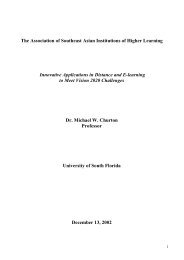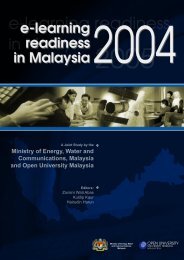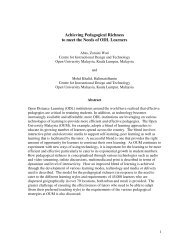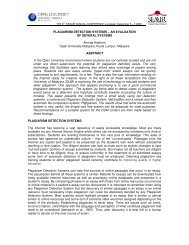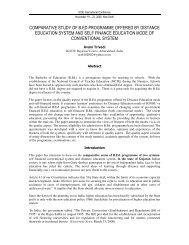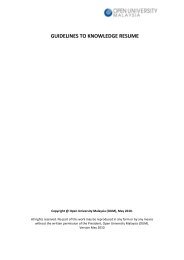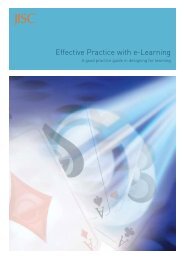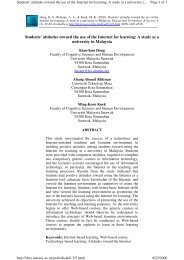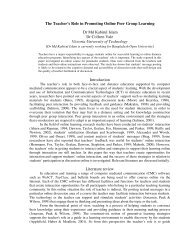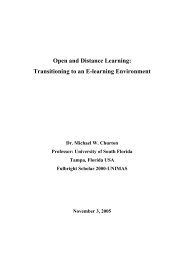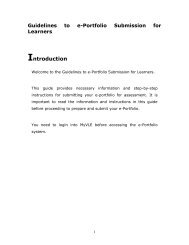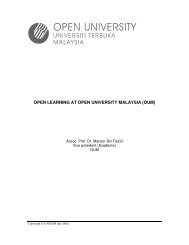lifelong learning and distance higher education - Asia Pacific Region
lifelong learning and distance higher education - Asia Pacific Region
lifelong learning and distance higher education - Asia Pacific Region
- No tags were found...
Create successful ePaper yourself
Turn your PDF publications into a flip-book with our unique Google optimized e-Paper software.
<strong>and</strong> even greater steps, <strong>and</strong> the decisions we make will have profound consequences forthe <strong>education</strong>al world of the future.In such a situation, it is essential for decision makers to have maps <strong>and</strong> compasses to helpthem their chart the course forward. Here the article by Tony Bates on research providesmany useful insights. Educational research, as Dr. Bates shows, is not an abstract, ivorytower pursuit, but something that provides essential knowledge for policy making. Oneof the things that emerges from his article (<strong>and</strong> is confirmed by other contributors) is thatonline <strong>education</strong> is not a miraculous panacea <strong>and</strong> that it is not enough simply to create anonline <strong>learning</strong> environment. Rather, “research has indicated that that very careful coursedesign <strong>and</strong> moderation are needed”. Another important research finding is that “<strong>distance</strong><strong>education</strong> is not a good substitute for conventional <strong>higher</strong> <strong>education</strong> for students straightfrom school” since these students usually lack sufficient independent <strong>learning</strong> skills.On the other h<strong>and</strong> “it is a powerful mechanism for supporting <strong>lifelong</strong> <strong>learning</strong>”. Dr.Bates also points out that “there is an undue emphasis on funding research into <strong>distance</strong><strong>education</strong> technologies; more funding needs to be devoted to the ‘softer’ areas of researchin <strong>distance</strong> <strong>education</strong>, such as policy research, cost-benefit analysis, instructional design,<strong>and</strong> learner support”. Thus, in addition to highlighting some significant research findings,his chapter also contains important pointers for the researchers themselves.A further general point that can be drawn from the contributions as a whole is that e-<strong>learning</strong> technology is not an end in itself, but a tool for conveying <strong>education</strong>al content.The tool is more appropriate in some situations than others, <strong>and</strong> often works better whencombined with other, more traditional tools. Furthermore, we should never become somesmerised by the tool that we forget the content. Nevertheless, ICT-based <strong>learning</strong> hasopened up enormous new vistas for <strong>distance</strong> <strong>higher</strong> <strong>education</strong> <strong>and</strong> has brought specialbenefits for the <strong>lifelong</strong> learner. The experience, insights <strong>and</strong> guidance gathered togetherin this volume will hopefully assist its readers in using the tool to the maximum benefit oflearners.154



